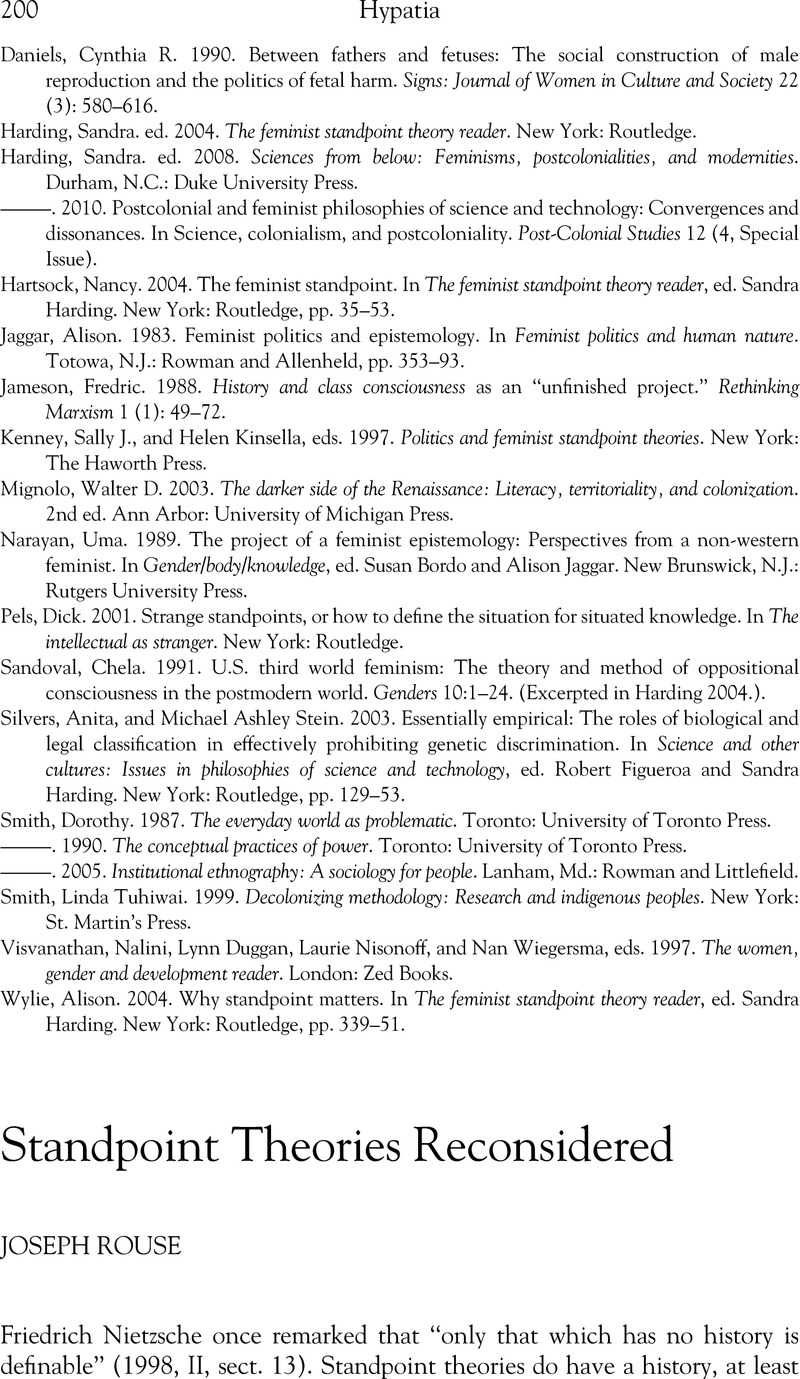Crossref Citations
This article has been cited by the following publications. This list is generated based on data provided by Crossref.
Keevers, Lynne
Treleaven, Lesley
Sykes, Christopher
and
Darcy, Michael
2012.
Made to Measure: Taming Practices with Results-based Accountability.
Organization Studies,
Vol. 33,
Issue. 1,
p.
97.
2016.
The Brain's Body.
p.
153.
Mussell, Helen
2016.
The Truth of the Matter.
Hypatia,
Vol. 31,
Issue. 3,
p.
537.
Steinbrenner, Sheila Young
Shawler, Celeste
Ferreira, Sandra
and
Draucker, Claire
2017.
The lived experience of help-seeking by South African women after sexual assault.
Health Care for Women International,
Vol. 38,
Issue. 5,
p.
425.
Wagner-Lawlor, Jennifer A.
2017.
Handbook of Anticipation.
p.
1.
Doucet, Andrea
2018.
Decolonizing Family Photographs: Ecological Imaginaries and Nonrepresentational Ethnographies.
Journal of Contemporary Ethnography,
Vol. 47,
Issue. 6,
p.
729.
Doucet, Andrea
2018.
The Palgrave Handbook of Relational Sociology.
p.
375.
Wagner-Lawlor, Jennifer A.
2019.
Handbook of Anticipation.
p.
501.
Medina-Minton, Natalie
2019.
Are Children an Oppressed Group? Positing a Child Standpoint Theory.
Child and Adolescent Social Work Journal,
Vol. 36,
Issue. 5,
p.
439.
Hazlett, Allan
2020.
CRITICAL INJUSTICE.
American Philosophical Quarterly,
Vol. 57,
Issue. 2,
p.
129.
Twis, Mary K.
and
Preble, Kathleen
2020.
Intersectional Standpoint Methodology: Toward Theory-Driven Participatory Research on Human Trafficking.
Violence and Victims,
Vol. 35,
Issue. 3,
p.
418.
Pitts‐Taylor, Victoria
2020.
Science, Critique, Authority, and Accountability.
Sociological Forum,
Vol. 35,
Issue. 1,
p.
229.
Arthur-Holmes, Francis
and
Abrefa Busia, Kwaku
2021.
Occupying the Fringes: The Struggles of Women in Artisanal and Small-Scale Gold Mining in Rural Ghana—Evidence from the Prestea–Huni Valley Municipality.
Gender Issues,
Vol. 38,
Issue. 2,
p.
156.
Hertz, Tilman
and
Mancilla Garcia, Maria
2021.
The Cod and the Cut: Intra-Active Intuitions.
Frontiers in Sociology,
Vol. 6,
Issue. ,
Jackson, Colin
2022.
All-Attainment Teaching in Secondary Mathematics.
p.
59.
Jackson, Colin
2022.
All-Attainment Teaching in Secondary Mathematics.
p.
17.
Wagner-Lawlor, Jennifer A.
2022.
The Palgrave Handbook of Utopian and Dystopian Literatures.
p.
165.
Bessell, Sharon
and
Mason, Jan
2022.
Handbook of Children’s Risk, Vulnerability and Quality of Life.
p.
133.
Westman, Claire Stephanie
2024.
Challenging Heteropatriarchy: The Contribution of Visual Activism to a South African Lesbian Standpoint.
Social and Health Sciences,
Majic, Samantha
and
Murib, Zein
2024.
The Biggest Decision of Your Life(Time)? Examining the Politics of Married at First Sight.
Social Sciences,
Vol. 13,
Issue. 11,
p.
618.



